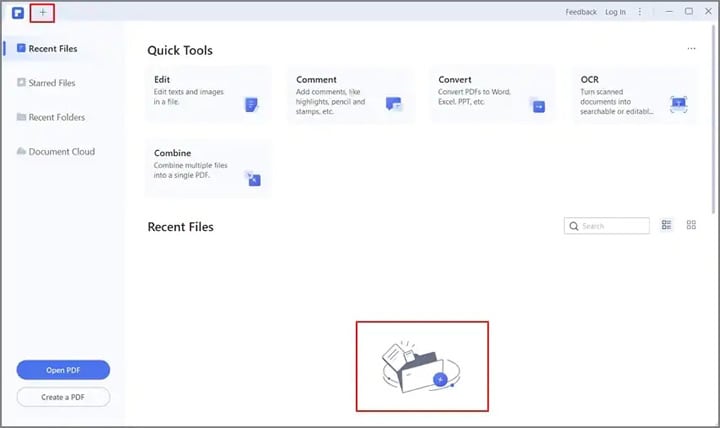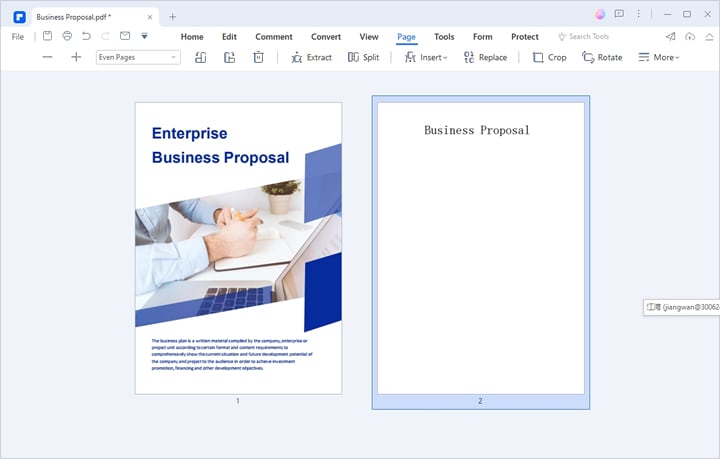PDFelement-Powerful and Simple PDF Editor
Get started with the easiest way to manage PDFs with PDFelement!
To be successful in your small business, you must implement the right strategies and ideas at the right time and with the right approach. And, if you want to start a small business to become successful, you should learn from the mistakes of other business owners. You will also need to experiment quickly with new strategies and learn from discoveries. And this is critical to keeping your small business afloat in a sea of competitors.
Document management has become an important part of operations for small businesses in this digital world. Here is the best document management solution for small businesses.

In this article
Part 1. Step-by-Step Guide: How To Start Your Own Business
If you want to start a business, you must work hard to make it a success. It will not occur overnight. You'll need extensive research, study, and learning about your industry, customers, and market. It would be best if you began at the beginning.
So, here are some of the best tips and strategies you can use to turn your company into a highly profitable small business.
1. Determine Your Business Idea
If you're considering starting a business, you probably already know what you want to sell online or what market you want to enter. Conduct a quick search for existing businesses in your desired industry. Discover what current brand leaders are doing and how you can do it better.
If you believe your company can provide something that other companies cannot (or can provide the same thing faster and cheaper), or if you have a solid idea and are ready to develop a business plan.
2. Research Your Product and Customer
Now that you've got a great idea, it's time to test it! Your product or business concept may pique your interest., but it is only worthwhile to pursue it if there is a market for it. There are numerous methods for conducting preliminary research before beginning to invest. You can look for market gaps and an underserved audience, conduct a focus group, and research your competition.
3. Write Your Business Plan
Once you've decided on an idea, you should ask yourself a few key questions: What is the purpose of your business? Whom are you trying to sell? What are your ultimate objectives? How will you fund your startup expenses? A well-written business plan can provide answers to these questions.
A solid business plan is essential whether you are a startup, SMB, or nearing the Fortune 500. Of course, writing business plans is a massive undertaking. But what if you needed something that required the input of others? What about an online form or a PDF template where responses from colleagues and managers are important?
PDFelement, on the other hand, has a collection of PDF templates for business planning. These are beautifully designed templates for businesses and companies unsure where to begin.
4. Assess Your Finances
Starting a business has costs, and you must decide how you will cover those costs. Can you fund your startup, or will you need to borrow money? Do you have enough money to support yourself until you profit if you plan to leave your current job to focus on your business? It's a good idea to figure out how much your startup costs will be.
5. Choose Your Legal Business Structure
It is critical to consider how each structure affects the amount of taxes you owe, daily operations, and whether your assets are at risk when structuring your business.
6. Register With the Government and IRS
Before you can legally operate your business, you will need to obtain several business licenses. You must, for example, register your company with the federal, state, and local governments. Before registering, you must prepare several documents.
Whatever option you select, it is critical to comprehend the reasoning behind your concept. Entrepreneurs should begin by writing a business plan or brainstorming a business name before determining the value of their idea.
7. Protect Yourself With Business Insurance
You must have business insurance even if you run a home-based business or do not employ anyone. Your business model and the risks you face determine the type of insurance you require. You may require more than one type of policy and additional coverage as your company grows. Workers' compensation insurance is required by law in most states if you have employees.
8. Manage Your Money
Finding the right product at the right time for the right market is usually the key to a successful business. However, maintaining that success depends on various other factors behind the scenes. When you have a good handle on your finances, you ensure that you are not overspending and have a backup plan in case your luck changes.
9. Get Business Funding for Your Startup
There are numerous ways to finance your business; some require significant effort, while others are more easily obtained. Small businesses may need to use a combination of different types of capital.
Consider how much money is required, how long it will take for the company to repay it, and your risk tolerance. Plan for profit regardless of which source you use. Choose the best funding source for your company based on the amount of money you require, the time frame for repayment, and your risk tolerance.

10. Build Your Team
Unless you intend to be your only employee, you'll need to recruit and hire a fantastic team to get your business off the ground. Entrepreneurs must pay equal attention to the "people" aspect of their businesses as they do to the "product."
It is also critical to determine how the team will collaborate. Defining roles and responsibilities, dividing labor, providing feedback, and collaborating when everyone is in different rooms will save you much trouble later.
11. Formulate Your Small Business Marketing Strategy
Whether starting a new business or looking for ways to expand an existing one, a marketing strategy can help you grow your company and increase sales. An effective marketing strategy will allow you to take a targeted and cost-effective approach to market activities, resulting in increased revenue and ROI (return on investment).
12. Choose Your Vendors
Running a business can be stressful, and you and your team will likely need help handling everything. When looking for B2B partners, you must be very selective. Because these businesses will have access to vital and potentially sensitive business data, finding someone you can trust is critical.
We advised potential vendors to inquire about their experience in your industry, track record with existing clients, and the type of growth they've assisted other clients in achieving.
13. Choose the Suitable Business Tool
Business tools can make your life easier and your company run more smoothly. The right tools can save you time, automate tasks, and help you make better decisions.
In every business, numerous documents are necessary for keeping track of things and formal and legal documents. Save your proposal in PDF format, whether you're an expert or a novice. This is critical. But don't settle for just any PDF. Use a feature-rich tool like PDFelement instead.
PDFelement lets you quickly create new PDF files from scratch or make changes to existing documents. For example, if you're converting paper records to digital, they can save you much time.
Using the PDFelement
Here are the steps on how to use PDFelement
Step 1Open your PDF file.
Select the desired action and open a PDF file in the File menu. Alternatively, you can drag a PDF into the interface, automatically opening the file. You can also open a file directly from the welcome page by clicking the Open Files icon.

Step 2Edit your PDF file.
Once the file is open, you can use the tool tab at the top to perform various tasks. Editing, converting, form-filling, electronic signature, security, and other functions are included.

Step 3Save your file.
When you're done editing a file, use the File menu to save it to your desktop.

PDFelement also offers a video introducing how to edit texts in PDF.
14. Grow Your Business
Your small business should be running smoothly by now. You've got great product photos, you're building online communities, you've nailed your fulfillment process, and you're hopefully making regular sales. So, what comes next? You may decide to stay small, focusing on developing relationships with a loyal customer base and managing everything on your own. Or you're ready to start your next venture.
Part 2. People Also Ask
In this section of the article, we will answer some frequently asked questions about marketing ideas for small businesses.
Q1. How Can I Start My Own Business With No Money?
You can start a successful business without any startup capital. Work on a business idea that capitalizes on your skill set to provide the market with something new and innovative. To reduce financial risk, continue working in your current position (or "day job") while developing a new business.
Q2. How To Start My Own Business Online?
The internet evolves so quickly that one year online is equivalent to five years in the real world. However, the fundamentals of starting and growing a successful online business have remained the same.
Stick to this order if you're starting a small business online. If you've been online for a while, take a quick look to see if there's anything you're missing or never got around to doing in the first place. You can't go wrong with the fundamentals.
Q3. How To Start Your Own Business Without a Degree?
A business degree is not required to start a business. On the other hand, a degree in business or a related field can give you the understanding and ability to run a successful business. If you don't have a degree, consider taking business courses to learn more about starting and running a business. These are available both online and at your local Small Business Administration office.
Conclusion
It is simple to start a business. However, running a successful one takes time, effort, and dedication. Take the time to research the companies that put people first, cultivate a trustworthy reputation, and build credibility and expertise in their industry.
Even if they've made a few mistakes along the way, these are the best teachers. You'll be well on your way to starting and running a profitable business that will delight your customers while making you money.
 Home
Home
 G2 Rating: 4.5/5 |
G2 Rating: 4.5/5 |  100% Secure
100% Secure




